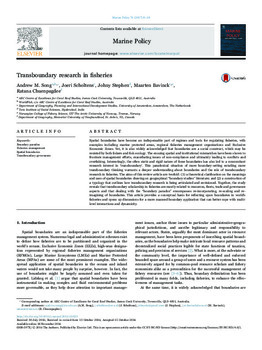Transboundary research in fisheries
Abstract
Spatial boundaries have become an indispensable part of regimes and tools for regulating fisheries, with examples including marine protected areas, regional fisheries management organizations and Exclusive Economic Zones. Yet, it is also widely acknowledged that boundaries are a social construct, which may be resisted by both fishers and fish ecology. The ensuing spatial and institutional mismatches have been shown to frustrate management efforts, exacerbating issues of non-compliance and ultimately leading to conflicts and overfishing. Interestingly, the often static and rigid nature of these boundaries has also led to a concomitant research interest in 'transboundary'. This paradoxical situation of more boundary-setting entailing more transboundary thinking warrants a deeper understanding about boundaries and the role of transboundary research in fisheries. The aims of this review article are twofold: (1) a theoretical clarification on the meanings and uses of spatial boundaries drawing on geographical

